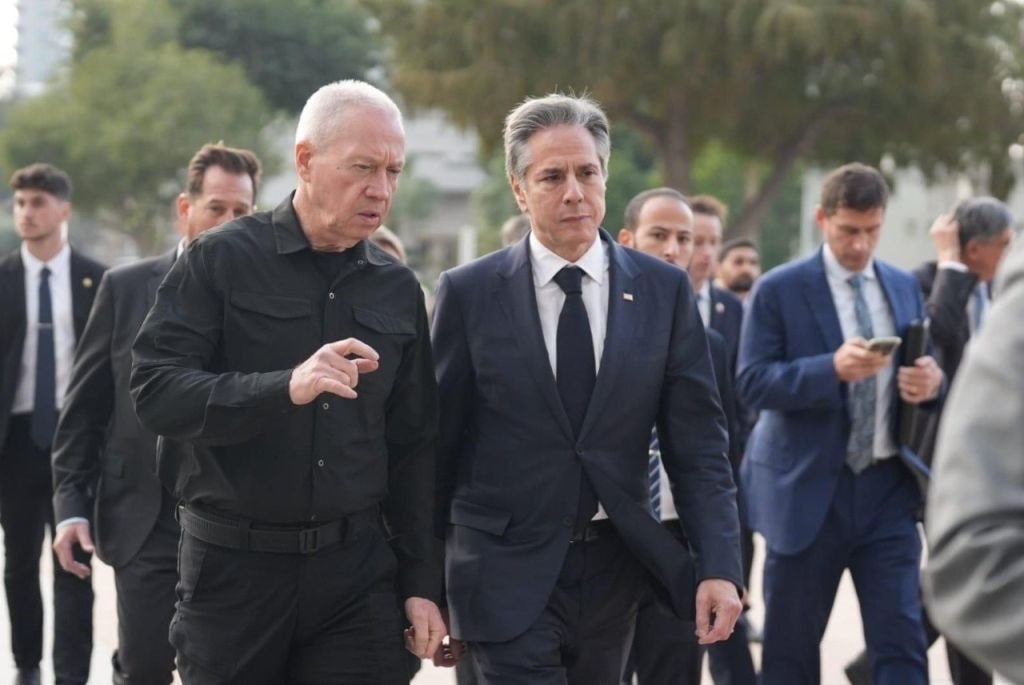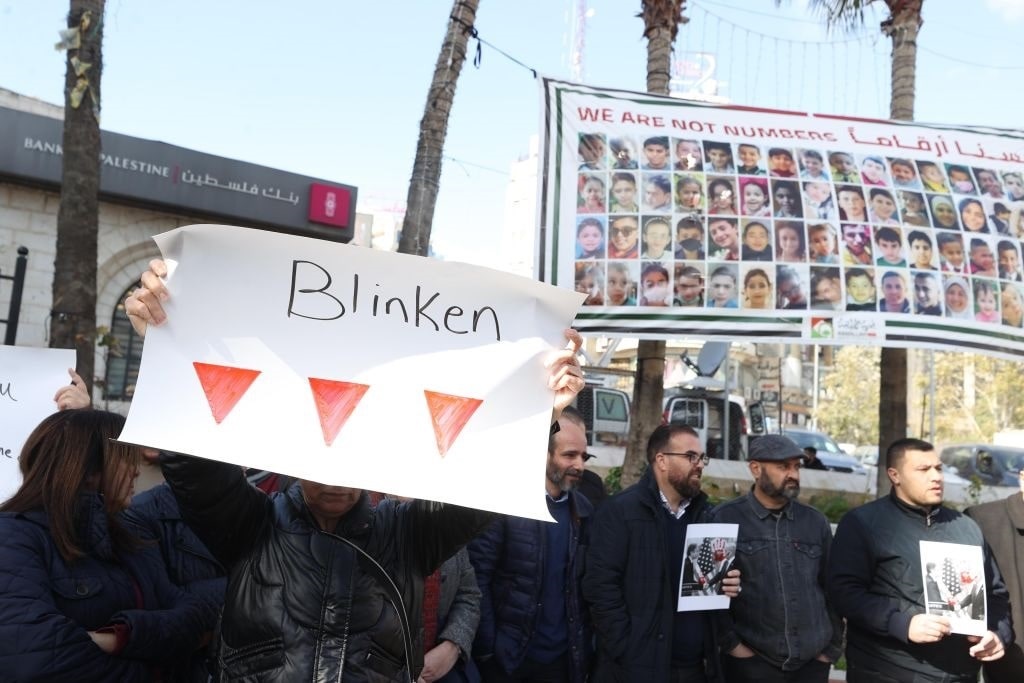Diplomatic missions to the Middle East often face uncertainty – and Secretary of State Antony Blinken’s most recent jaunt was no exception. His past visits to Israel and its neighbors have resulted in unremarkable outcomes. Nonetheless, the US chief diplomat traveled to the Middle East again from January 4 to 11. Blinken had stops in Turkey, Crete, Greece, Jordan, Qatar, United Arab Emirates (UAE), Saudi Arabia, Israel, the West Bank, and he concluded the whirlwind string of visits with Egypt.
Blinken Traveled to the Middle East for the Fifth Time
On his fifth trip to the region since the savage October 7 Hamas terrorist attacks against southern Israel, Biden’s foreign policy leader set out a daunting schedule and equally aggressive set of objectives. The substantive goals of the trip, according to a Foggy Bottom press statement, centered on Secretary Blinken underscoring “(T)he importance of protecting civilian lives in Israel and the West Bank and Gaza; securing the release of all remaining hostages; our shared commitment to facilitating the increased, sustained delivery of life-saving humanitarian assistance to civilians in Gaza and the resumption of essential services; and ensuring that Palestinians are not forcibly displaced from Gaza.”
After the US mission’s meetings in Al Ula, Saudi Arabia, and before heading to Israel on January 8, Blinken met briefly with the press. His main message was:
“(T) here’s broad agreement on a few basic objectives: first, that Israel and Israelis should be able to live in peace and security, free from the fear of terrorist attacks or aggression from any of their neighbors; second, that the West Bank and Gaza should be united under Palestinian-led governance; third, the future of the region needs to be one of integration, not division and not conflict; and fourth, for that to happen, we need to see the establishment of an independent Palestinian state.”

Antony Blinken (R) and Israeli Defense Minister Yoav Gallant (L) (Photo by Elad Malka (IMoD)/Anadolu via Getty Images)
Blinken discussed an agreement among the countries he visited to work together to “help Gaza stabilize and recover” and achieve a way forward to a “long-term peace, security, and stability in the region as a whole.” These are words heard before and never realized. Israel, on the other hand, has made its position clear. There will be no ability for the Hamas savages and other Palestinian terrorists to reconstitute their militias. That’s how Israel will be safe to live in peace.
During talks in Israel, Blinken met with his counterpart, Israeli Foreign Minister Israel Katz. According to the State Department readout of the discussion, the secretary reiterated America’s support for the Israel Defense Force (IDF) to ensure another October 7 “cannot be repeated.” But he also counseled the foreign minister on the need “to take all feasible steps to avoid civilian harm in Gaza.” Blinken talked about securing “critical life-saving humanitarian assistance throughout Gaza.” Additionally, Blinken again took on “preventing the expansion of the conflict.” This repeated refrain must be tiresome for Israeli leaders. Blinken was talking to the wrong audience. He needs to take that discussion to the mullahs in Tehran.
Israeli Leadership Heard US Talking Points Again
Blinken also met with Israeli Prime Minister Benjamin Netanyahu, Defense Minister Yoav Gallant, and Israeli President Isaac Herzog. The US emissary conveyed similar talking points with them, as well. The IDF must take all “feasible” precautions not to harm civilians; it must engage mutually with the US in all possible efforts to achieve the release of hostages held by Hamas; it must “facilitate increased and sustained” humanitarian aid to Gazans; it must do everything possible to avoid expanding the conflict within the region; and finally, the IDF should ensure “Israel’s security” by the “establishment of an independent Palestinian state.” It is the same old US position regarding the Israel-Hamas war that Israel has heard repeatedly.
 The meeting with the Palestinian Authority Mahmoud Abbas in the West Bank town of Ramallah allowed Secretary Blinken to discuss timely issues vital to the Palestinians and Israelis. They talked about the increased violence in the West Bank and what the US might “do to address extremist violence.” As he had done in his meetings with the Israeli government officials, Blinken reiterated the US position advocating for a “Palestinian State alongside the State of Israel, with both living in peace and security.”
The meeting with the Palestinian Authority Mahmoud Abbas in the West Bank town of Ramallah allowed Secretary Blinken to discuss timely issues vital to the Palestinians and Israelis. They talked about the increased violence in the West Bank and what the US might “do to address extremist violence.” As he had done in his meetings with the Israeli government officials, Blinken reiterated the US position advocating for a “Palestinian State alongside the State of Israel, with both living in peace and security.”
The next stop was Bahrain for discussions with His Majesty King Hamad bin Isa Al Khalifa in Manama. The central topic was the Iran-backed Houthis’ undeterred attacks on Red Sea merchant vessels. Continuing with his talking points, Blinken emphasized the US desire to ensure the Israel-Hamas war did not escalate into the Gulf Region. King Hamad must have found the conversation curious since raising the Houthi terrorists’ attacks on commercial cargo and tanker shipping is painful evidence the violence has already escalated.
Important Statement Comes at end of Press Conference
Looking at the trip in retrospect, one moment put the meetings in perspective and underscored why Blinken took on the visit to the Middle East nations. After his visits with Israeli government officials, Secretary Blinken held a press availability opportunity in which he recapped his meetings in Israel. The answer to the last question posed in the session put Israel, the Hamas terrorists, and the conflict in context. Walid Al-Omari, writing for Al Jazeera, asked why the US as a superpower doesn’t “oblige the parties and especially the Israeli Government to cease fire Gaza and respect the United Nations and the peaceful solution instead of both sides continuing wash blood by more blood.”
To his credit, Secretary Blinken provided the answer everyone should keep in mind. He said:
“I think it’s very important to remember that everyone has choices to make, and that includes Hamas. Hamas could have ended this on October 8 by not hiding behind civilians, by putting down its weapons, by surrendering, by releasing the hostages. None of the suffering – none of the suffering – would have happened if Hamas hadn’t done – did what it did on October 7 and had it made different decisions thereafter. So, it’s very important to keep that in perspective, and again, this could end tomorrow if Hamas makes those decisions.”
Wrapping up the ten-country diplomatic tour de force, Blinken met with Egypt’s President Abdel Fattah el-Sissi. As in the other meetings, the focus of the discussion was what Gaza would look like after the hostilities ended. “American officials claimed modest success in getting wide regional support for planning for reconstruction and governance in Gaza after Israel’s war with Hamas ends,” the Associated Press reported.
Secretary Blinken had a nearly impossible mission to undertake, and he carried the Biden administration’s foreign policy water with the aplomb of a professional diplomat. Whether his objectives were met, however, remains to be seen. If Israel’s neighbors chip in support to revitalized Gaza without Hamas, then there was some success. As for the White House, if there is an upside to Blinken’s trip, it is that they knew where at least one of its Cabinet secretaries was. That may be the only tangible achievement the US can claim.
The views expressed are those of the author and not of any other affiliation.




